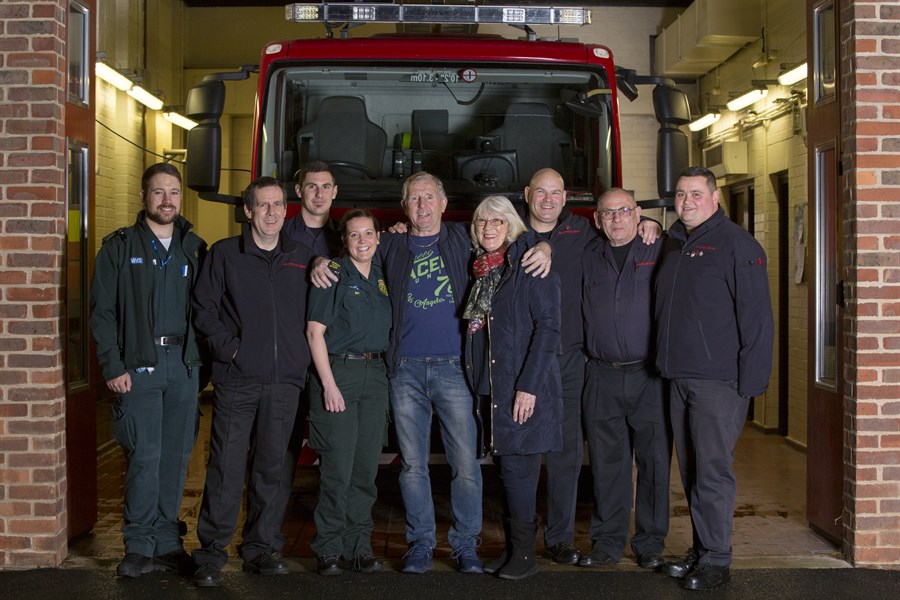Sevenoaks grandad reunited with life-savers after football match collapse
12 February 2018
Public, Immediate Emergency Care
A grandfather from Sevenoaks has visited Paddock Wood fire station to be reunited with firefighters and ambulance staff who helped save his life after a cardiac arrest.
His visit coincides with the installation of a new public access defibrillator outside the fire station. Defibrillators, which can be life-saving if used in the early stages of cardiac arrest, are currently being fitted at all Kent Fire and Rescue Service (KFRS) fire stations across Kent and Medway, and will be available for members of the public to use.
70-year-old football fan Alan Rogers, from Riverhead, collapsed while watching his favourite local team playing an away game at the grounds opposite Paddock Wood fire station on a Sunday morning last September. One moment, he was chatting with friends and the very next, he literally fell to the ground. Thanks to the combined efforts of the crew, the community and paramedics, he was successfully resuscitated.
Players and members of the public who knew him immediately started CPR (cardiopulmonary resuscitation), while someone else alerted the fire crew at Paddock Wood fire station. Firefighters Dave Franks and Dave Turner, who were temporarily located at the station, immediately put in a call to mobilise other crew members, and ran across the field with their medical bags to help. They found several people with Alan, taking it in turns to carryout CPR, with Paddock Wood on-call firefighter Marc Scott, who happened to have been playing in the match, helping to control the situation and concerned members of the public.
FFs Franks and Turner set up a KFRS defibrillator, while Paddock Wood crew manager Ken Collins and firefighter Alan Dengate, who had swiftly responded to the call for assistance, gave overall support, also helping with CPR and management of the incident. They administered two shocks with the defibrillators while patient care was overseen by Natalie Arkle, Operational Team Leader for South East Coast Ambulance Service (SECAmb) and emergency care support worker Neil Rich. Mr Rogers was then transferred to hospital for emergency surgery by air ambulance.
Four months on, and Mr Rogers says he’s feeling fighting fit, returning to his job as a heating engineer, and even returning to coaching goalkeeping. Speaking of his visit to the station with his wife, Shirley, he said: “I recall nothing at all of the day of my heart attack, and I was overwhelmed when I was told how many people had worked so hard to bring me back. It is so wonderful to finally meet the firefighters and ambulance staff who helped save my life – I’ll always be thankful to them.
He added: “I am also grateful to members of the football club who dived into help me and immediately started CPR, which I understand was key to my survival, as was the quick access to a defibrillator that the firefighters carried. It hits home how important it is for people to learn CPR, and it is reassuring to know that Kent Fire and Rescue Service (KFRS) is fitting defibrillators outside all of their fire stations, which will ultimately save the lives of more people like me.”
Paddock Wood crew manager Ken Collins said: “We have been co-responding in partnership with SECAmb from Paddock Wood for around nine years now and rarely get the opportunity to meet the people we have helped. It was such a pleasure to welcome Mr and Mrs Rogers to the station and it’s nice to know that, along with others on the day, we had a part in saving his life.”
Natalie Arkle of SECAmb praised the efforts of all those involved in helping Alan. She said: “This was a really exceptional example of community teamwork and really highlights the importance of good CPR and early access to defibrillation. It really did make a difference and it was a pleasure to meet Mr Rogers again and find out how well he has recovered.
KFRS Group Manager Karen Pointer said: “The roll-out of public access defibrillators (PADs) at every fire station is a continuation of our combined efforts with our partners to ensure that our communities are as equipped as they can be to help save lives. This potentially life-saving equipment, which is housed in lit, marked cabinets will be are available for any member of the public to use in an emergency. They come with easy-to follow electronic verbal instructions, and will be regularly checked and maintained by firefighters at each station.
“Having ready access to a defibrillator, together with a basic knowledge of CPR, can make a huge difference to the outcome for someone in cardiac arrest, providing potentially early life-saving intervention at a point when every second counts. We would encourage everyone to learn basic CPR and familiarise themselves as to the location of their nearest Public Access Defibrillator, in case they ever need to use it.”
As well as the new installations at fire stations, which are expected to be completed by March 2018, public access defibrillators are already installed in a variety of other public places across Kent and Medway.
Kent Fire and Rescue Service works in partnership with SECAmb to promote and deliver free CPR training to the public and school children as of the annual ‘Restart a Heart’ campaign run by the British Heart Foundation and the Resuscitation Council UK.
Could you become an on-call firefighter? Find out more about becoming an on-call firefighter at Paddock Wood

news 08-02-2018